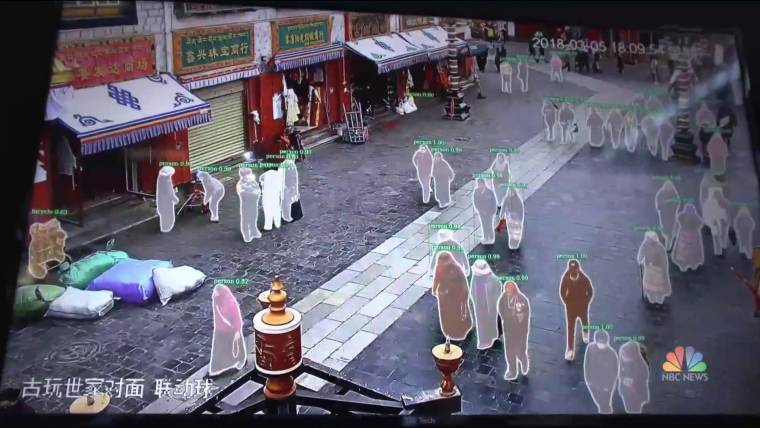SHANGHAI — A bespectacled eight-year-old has become the poster child for China’s campaign to dominate the world of high tech.
From his home in Shanghai, Vita Zhou hosts training videos for other children on how to code for artificial intelligence. He already has almost 80,000 followers on the Chinese streaming website Bilibili, and some of his videos have gained more than 1.3 million views. Vita has even attracted the attention of Apple CEO Tim Cook, who sent him birthday wishes Monday on Weibo, China’s equivalent of Twitter.
“What do you think? Isn’t it easier to write code once you understand how it works?” Vita says in one video. With the help of his dad, Zhou Ziheng, he demonstrates how to write codes with Apple-developed Swift Playgrounds, an app teaching kids basic coding through interactive games.
Vita’s celebrity comes as China steps up efforts to become a world leader in artificial intelligence by 2030. The trend of teaching young people to code has been on the rise in recent years, particularly as the Asian giant fights to close the gap in its workforce in the technology sector, most notably AI talent. In November, China’s education ministry updated its curriculum to include books about AI, big data, coding and quantum computing.
A quarter of the 422-page recommended reading list is now about science, math, chemistry, aerospace, medicine and most notably AI.
“Coding’s not that easy but also not that difficult — at least not as difficult as you have imagined,” Vita, who is familiar with Swift, Scratch and C++ languages, told the AFP news agency.
China has a lot of ground to make up on AI, with the number of top researchers in the field standing at one-fifth of that in the United States in 2017, according to research by the Washington-based Center for Data Innovation.
Get breaking news and insider analysis on the rapidly changing world of media and technology right to your inbox.
At the same time, it faces a shortage of 5 million AI professionals, according to a 2017 article from the state-owned newspaper People’s Daily.
These disadvantages have not stopped it from setting ambitious targets: The country aims to catch up with the U.S. next year, based on “A Next Generation Artificial Intelligence Development Plan,” a government blueprint.
In order to close in on the talent gap, the country is now speeding up AI education for children, in addition to efforts to increase the talent base from universities. By 2018, there were 96 Chinese universities with AI-related programs, up from just 19 in 2017.
Despite some shortcomings, a trove of Chinese AI companies such as iFlytek, SenseTime, Cloudwalk and DJI, have caught the world’s attention for standing out in sound recognition, facial recognition and drone technologies. China’s big tech companies, such as Baidu, Tencent, Alibaba and Huawei, also have invested heavily in AI research and development.
Some of those companies have taken a hit in China’s trade war with the U.S., with Washington blocking a few Chinese tech firms from acquiring its most advanced technologies. But experts say the roadblocks are only fueling China’s desire to get ahead.
“The increasingly fierce trade and technology competition between China and the U.S. puts pressure on China to improve its innovative capacity,” said Zhang Xusheng, a science, technology, engineering and math professor at Zhejiang University. “And it naturally means we need to bring the students to study high-tech and be more innovative.”
In 2018, the education ministry added AI to the high school curriculum, encouraging around 25 million teenagers to study the technology. The same year, China’s first AI textbook for high school students — which introduces the basics of image recognition, sound recognition, text recognition and deep learning — was put into use in more than 40 pilot schools.
“I would like to read the books to explore the scientific reasoning behind things like AI, aerospace, programming and big data,” Cui Jingjing, 14, a high school student in Fujian, said. “I am also keen to join science competitions.”
“I think China will win the AI race with the U.S.,” Cui said, “We are catching up very fast.”
China is not alone in ramping up AI education. While the private sector has led the response to AI, governments like France, South Korea and the United States also have strategies in place to expand their workforce in the sector with increased investments, although predominantly at the postsecondary level, according to a 2019 UNESCO report.
Many European Union member states are also reviewing their curricula to integrate more lessons about computational thinking in the classroom. Some countries like Austria, Poland and Lithuania have long provided strong computer science education in high schools.
The enthusiasm for AI education goes beyond policy. The market value of the coding industry for children reached around $57 million in 2018 and is expected to surge to around $4.3 billion by 2023, increasing 650 percent in the span of five years, according to a report by iResearch, a Shanghai-based consulting company.
That investment is transforming classrooms. In Shenzhen, China’s tech hub, an AI program for students in grades 3 to 8 was being piloted in 2019.
Zheng Weicheng, a primary school math teacher in Fujian province, thinks that teaching AI also has broader benefits by helping children establish scientific concepts and improve their problem-solving ability, which will directly benefit their future development.
“Well-equipped youths lead to a powerful country,” Zheng said.
2020-01-04 11:14:00Z
https://www.nbcnews.com/news/world/china-ramps-tech-education-bid-become-artificial-intelligence-leader-n1107806
CAIiEEdlO5gj_CL3yoYXD96gUqgqGQgEKhAIACoHCAowvIaCCzDnxf4CMM2F8gU
Bagikan Berita Ini
















0 Response to "China ramps up tech education in bid to become artificial intelligence leader - NBC News"
Post a Comment